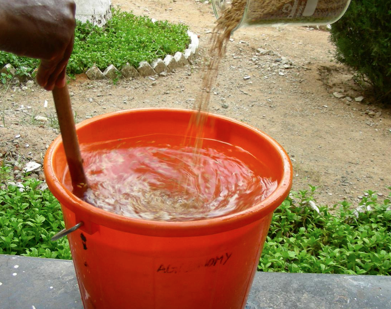Seed Treatment Techniques for Paddy
Seed Treatment for Improved Germination
- Dry seeds in bright sun light (between 12.00 p.m. to 1.00 p.m.) for half an hour before sowing to improve the germination and seedling vigour.
- Soak the paddy seeds along with a gunny bag in water for 12 hours and then soak in biogas slurry for 12 hours before sowing.
- Soak paddy seeds in Panchagavya (35 ml per litre of water) for 30 hours before sowing.
- Soak paddy seeds tied in khada cloth in sweet flag extract (500 gms of sweet flag rhizome powder in 2.5 litres of water) for 30 minutes and shade dry before sowing.
- Soaking the seeds in cow dung extract enhances the germination capacity. Take 1⁄2 kg of fresh cow dung and 2 litres of cow’s urine and dilute with 5 litres of water. Soak 10 - 15 kg of seeds that are previously soaked in water for 10 - 12 hours, in this cow dung extract for 5 - 6 hours. Dry the seeds in shade before sowing in the nursery.
|
 |
- Fill the paddy seeds in a closely-knit bamboo basket lined with Salvadora persica leaves at the bottom and pour about 10 to 12 litres of water over the basket. Cover the basket with Salvadora leaves and place a weight over it. Leave the setup undisturbed for 24 hours before sowing. This will help in early and vigorous germination.
- Mix biofertilizers like Azospirillum / Phosphobacteria / Pseudomonas (@ 1.25 kg / 60 – 70 kg of seeds) in one litre of cooled rice gruel and mix it with sprouted seeds and shade dry for 30 minutes before sowing.
|
Seed Treatment for Healthy Seedlings
- Take the paddy seeds in a tightly closed gunny bag and soak it in the biogas slurry for 24 hours before sowing to get green and healthy seedlings with well-developed root system. These seedlings will get established well soon after the transplantation.
- Collect cow's urine in a mud pot and keep it for 48 hours. Soak paddy seeds in 10% of this cow's urine (100 ml cow's urine in 1 litre of water) before sowing for healthy crop. Seeds should be shade dried for half an hour before sowing.
- Mix Vitex, Tulsi and Pongam leaves extract (pound 3 kgs of each leaves and extract) with fresh cow dung solution and soak 25 kg of paddy seeds tied in a gunny bag in this solution for 12 hours. Seeds should be shade dried for half an hour before sowing. This will produce healthy and disease resistant seedlings.
Note : 3 kgs of each of the leaves should be collected and pound. This should be added to 1 litre of water and the extract is filtered. This should be added to fresh cow dung extract (5 kg cow dung in 15 litres of water).
Seed Treatment for the Prevention of Pest and Disease Attack
- Soak seeds in water for 12 hours and then mix it with 10% cow’s urine (10 ml cow’s urine + 90 ml water) or 5% prosophis kashaayam (5 ml kashaayam + 95 ml water) and dry it for 30 minutes. Use the seeds for sowing within 24 hours. This will enhance the resistance of the paddy against bacterial leaf blight disease.
- Soak paddy seeds tied into small bundles using kada cloth in cow’s urine solution (500 ml of cow’s urine with 2.5 litres of water) for 30 minutes and shade dry before sowing. This method of seed treatment prevents the crop from seed borne fungal and bacterial diseases.
- Soak paddy seeds in 20% mint (Mentha sativa) leaf extract (200 ml of leaf extract mixed with 800 ml of water) for 12 hours before sowing. This will increase the germination rate and igour of seedlings. This will also help in the control of Helminthosporium leaf spot disease in paddy.
- Soak the sprouted seeds of paddy tied in small bags in sweet flag solution (500 gms of sweet flag rhizome powder in 2.5 litres of water) for 30 minutes and shade dry before sowing. This will improve the resistance of the seedlings against Seed borne bacterial and fungal diseases.
Seed Treatment for Protection and Nutrition
Mix paddy seeds with cow dung before sowing. The cow dung covering the seeds will protect them from birds and other insects in the nursery and also acts as manure for seeds. This practice increases the drought resistance and acts as a seed hardening measure. It is generally preferred for dryland paddy cultivation.
Updated on : Nov 2014 |

